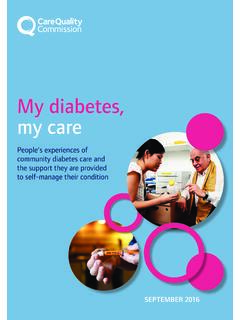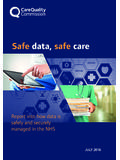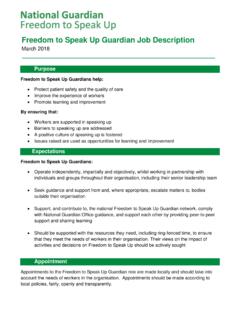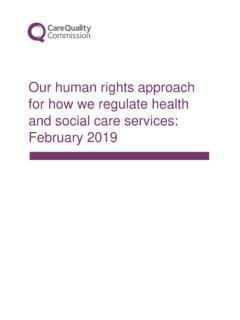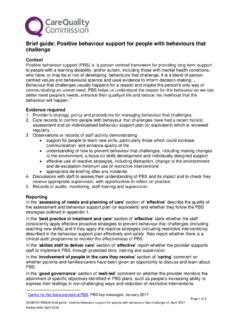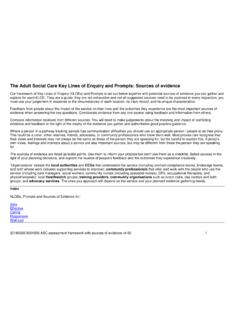Transcription of Protect, respect, connect – decisions about living and ...
1 1 Protect, respect, connect decisions about living and dying well during COVID-19 CQC s review of do not attempt cardiopulmonary resuscitation decisions during the COVID-19 pandemic Final report 2 Contents Foreword .. 3 Summary .. 4 Introduction .. 8 People at the centre .. 15 Staff training and support .. 29 Leadership, governance and 34 System response to the pandemic and DNACPR decisions .. 36 Conclusion and 41 Appendix A: How we carried out our review .. 44 Appendix B: Data appendix .. 48 3 Foreword The coronavirus pandemic has placed unprecedented pressure on health and care services, clinicians, professionals and workers. Together, they have worked to respond to the challenges that the pandemic has created, and to provide people with the care, treatment and support they need. This support has included talking about whether people would want to receive cardiopulmonary resuscitation (CPR) if they stopped breathing or their heart stopped.
2 At the beginning of the pandemic we heard concerns that decisions were being made without involving people or their families, and were being applied to groups of people, rather than taking into account each person s individual circumstances. We acted quickly to remind providers that such actions were unacceptable, and we welcomed the Secretary of State s request to look more widely at this issue. Our review has set out to establish a picture of how do not attempt cardiopulmonary resuscitation (DNACPR) decisions were being made in the earlier stages of the pandemic shining a light on what contributed to important conversations around end of life care being done well, and what may have led to them falling short. While it is not in our gift or the scope of our review to make judgements about what may or may not have contributed to specific deaths, it is important to understand the impact of not discussing DNCAPR decisions at an appropriate time as part of a holistic conversation about advance care planning.
3 What we have found through our review is a worrying picture of poor involvement, poor record keeping, and a lack of oversight and scrutiny of the decisions being made. Without these, we cannot be assured that decisions were, and are, being made on an individual basis, and in line with the person s wishes and human rights. Our report highlights that more work is needed to support health and care clinicians, professionals and workers in holding conversations about DNACPR decisions as part of a holistic approach to advance care planning. More widely, it shows the need for a cultural shift to ensure that everyone feels supported to hold open and honest conversations about what they would like to happen at the end of their lives. When done in the right way these conversations can be a positive experience for all involved. The outbreak of the pandemic has provided an opportunity for change.
4 We need to capitalise on this momentum to ensure that conversations about advance care planning and DNACPR decisions are high on everyone s agenda. Rosie Benneyworth Chief Inspector of Primary Medical Services and Integrated Care 4 Summary From the beginning of the COVID-19 pandemic, there were concerns that do not attempt cardiopulmonary resuscitation (DNACPR) decisions were being made without involving people, or their families and/or carers if so wished, and were being applied to groups of people, rather than taking into account each person s individual circumstances. In October 2020, the Department for Health and Social Care commissioned CQC to conduct a special review into these concerns. Our review, which took place between November 2020 and January 2021, looked at how DNACPR decisions were made in the context of advance care planning, across all types of health and care sectors, including care homes, primary care and hospitals.
5 During our review, we heard about the experiences of over 750 people and about the distress that people face when they do not feel involved in decisions about their care. When done well, DNACPR decisions are an important aspect of advance care planning, and people should be fully involved in discussions about their care. Our findings show that there needs to be a focus on three key areas: 1. Information, training and support The quality of people s experiences is greatly impacted by having the time and information they need to talk about what care and support they want. People s experiences of DNACPR decisions varied. We heard that some people felt they had been involved in the decision-making process, as part of a holistic conversation about their care. However, others felt that conversations around whether they would want to receive cardiopulmonary resuscitation (CPR) came out of the blue and that they were not given the time or information to fully understand what was happening or even what a DNACPR was.
6 In some cases, people were not always aware that a DNACPR decision was in place. This could be hugely distressing for people and their families and/or carers. It is concerning that some people across a range of equality groups, including older people, people with dementia and people with a learning disability, told us that they were not supported to the extent they needed to be in advance care planning conversations, or given the information they needed in an accessible way. Every DNACPR decision must take account of each person s individual circumstances or wishes. While most providers we spoke with were unaware of DNACPR decisions being applied to groups of people, we heard evidence from people, their families and carers that there had been blanket DNACPR decisions in place. The training and support that staff received to hold these conversations was a key factor in whether they were held in a person-centred way, that met people s needs and protected their human rights.
7 If people and health and care staff are not fully informed about advance care planning, or given the opportunity and enabled to discuss DNACPR decisions in a person-centred way, there is a clear risk of inappropriate decision making and a risk 5 of unsafe care or treatment. It also raises concerns that people s human rights and rights under the Equality Act 2010 had not been considered or were at risk of being breached. 2. A consistent national approach to advance care planning There is a need for a consistent national approach to advance care planning and DNACPR decisions , and a consistent use of accessible language, communication and guidance to enable shared understanding and information sharing among commissioners, providers and the public. Across all the areas that we looked at, there were many types of advance care planning in use.
8 These included ReSPECT plans, local treatment escalation plans and DNACPR decisions . Not only do these models use different approaches, but they also use different types of forms and documentation. This lack of consistency and the problems this causes could affect the quality of care received by the person, and result in missed opportunities to support them in the right way at the right time. How health and care professionals talked about advance care planning and DNACPR decisions also varied. The huge number of acronyms and use of inaccessible language could be confusing and prevent people from being fully engaged in conversations around their care. Every area we looked at had taken steps to make sure that services were aware of the importance of taking a person-centred approach to DNACPR decisions and advance care planning. However, we found that providers had to cope with a huge amount of guidance about all aspects of the pandemic that lacked clarity and changed rapidly, leading to confusion.
9 3. Improved oversight and assurance There is an urgent need for regional health and care systems, including providers, clinical commissioning groups and patient representative bodies, to improve how they assure themselves that people are experiencing personalised, compassionate care in relation to DNACPR decisions . Most providers and health and care professionals told us that people, their families, carers or advocates were involved in conversations about their care, including DNACPR decisions . But poor record keeping and lack of audits meant that we could not always be assured that people were being involved in conversations about DNACPR decisions , or that these were being made on individual assessments. Once DNACPR decisions were in place, it varied whether providers and local systems reviewed them. We were also concerned about whether local areas had oversight of training and support for health and care professionals to ensure they were making sound clinical decisions that are person-centred and protect people s human rights.
10 6 Our recommendations DNACPR decisions need to be recognised as part of wider conversations about advance care planning and end of life care, and these decisions need to be made in a safe way that protects people's human rights. To do this, a new Ministerial Oversight Group must be set up to look in depth at the issues raised in our report. The group, which should include partners in health, social care, local government and voluntary and community services, should be responsible for overseeing the delivery and required changes of the recommendations of this report. Lead responsible body: Department of Health and Social Care Information, training and support People must always be at the centre of their care, including advance care planning and DNACPR decisions . To do this, providers must ensure that people and/or their representatives are included in compassionate, caring conversations about DNACPR decisions as part of advance planning conversations.
